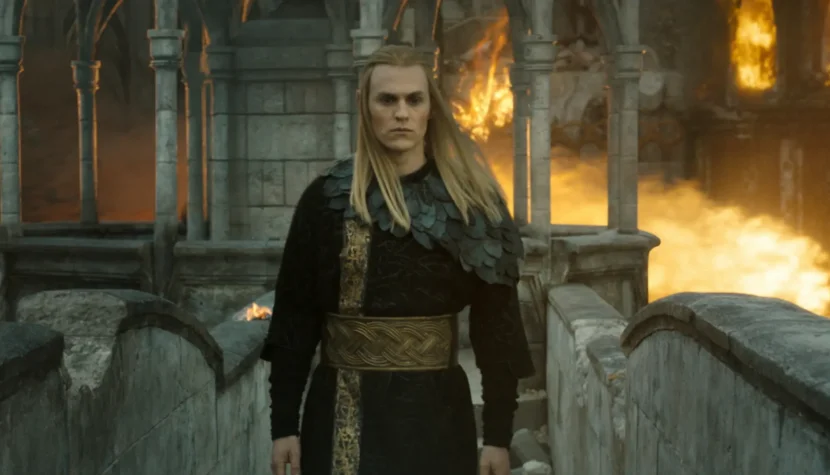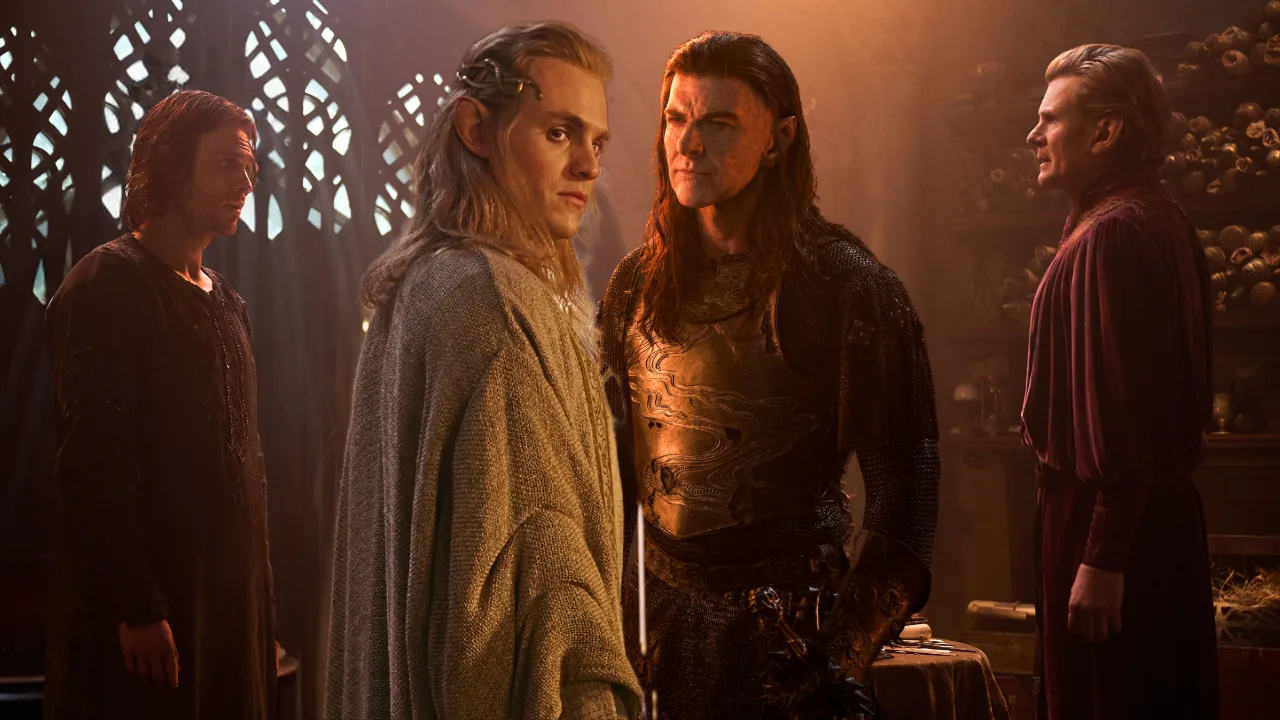Sauron and Celebrimbor’s Oscar-worthy drama. The Rings of Power – A Summary of Season 2

After watching the second season of “The Rings of Power”, I am convinced that it’s a show that should be recommended to viewers before watching “The Hobbit” and “The Lord of the Rings” by Peter Jackson. It would serve as a complementary background, explaining many threads that Jackson either merely touched upon or skipped entirely. After the fantastic journey of the second season, it’s also clear that Amazon, together with Patrick McKay and John D. Payne, must produce a third season of “The Rings of Power”. Many characters, such as Elendil, Isildur, or Durin IV, still haven’t reached their full potential. And Sauron himself should eventually reach the battlefields near Barad-dûr, where he loses the finger bearing the One Ring. But before all that happens, viewers can immerse themselves in this unique prelude to the events of “The Lord of the Rings”. This prologue stands out, particularly with its dramatic exploration of the cooperation and conflict between Sauron and Celebrimbor, as well as the history of the dwarven city’s downfall, Khazad-dûm, spanning over generations of kings. “The Rings of Power” also offers an insightful analysis of what it means to be good or evil, presenting a much broader philosophical spectrum, something that was missing in Tolkien’s original texts.
Peter Jackson portrayed Sauron in “The Hobbit” and “The Lord of the Rings” as a stereotypical, impersonal villain—a symbol of evil devoid of emotion, represented by the aggressive, ever-watching eye on a tower in the plains of Gorgoroth. According to Jackson, and the original text as well, Sauron was only capable of destruction, using tools that mirrored him: militarized, mindless forces that inflicted violence on everything weaker and different in Middle-earth. His world built nothing, improved nothing—it sowed only extermination, which, even from the perspective of the orcs, seemed ultimately pointless in the long run. And that was the point. In Tolkien’s interpretation, and later Jackson’s, evil was chaos, seen as the opposite of good, which represented creativity, pleasure, and construction. However, Sauron, as a mythological character with a rich backstory, deserved a more nuanced presentation of who he was and what he became in the world he wanted—not to destroy, but to change and improve. Most importantly, the question of why he became this way needed to be answered. And that’s the greatest value of “The Rings of Power”: it showed viewers Sauron from many angles, presenting good and evil as values open to interpretation, gradation, or perhaps even exchange, depending on the perspective. This fluidity, or mutual substitution of good and evil, became possible because we learned much more about Sauron, Adar, and his children—the Uruks. The rest of the characters, even Gandalf, took a backseat, which distinguished the first season from the second. The second season benefited because it didn’t overwhelm viewers with the adventures of Nori, Isildur, Arondir, the unfulfilled heroine Galadriel, or Elrond orbiting around her, in ways that could overshadow the Sauron, Adar, and Celebrimbor storyline. I admit that the Númenor subplot could have been trimmed further, as it was one of the weakest elements. I hope that in the third season, when the city faces inevitable destruction, it will be better integrated into the overall plot.

These themes were present but served as a backdrop to the struggle of two determined characters to forge the Rings of Power that could reshape the world. And this world was far from perfect, or even livable at the time. What did the Valar, led by Eru, think of all this? Probably not much, since they left Middle-earth in the hands of lesser beings—the Ainur, which include Gandalf, Saruman, and, of course, Sauron. These divine characters are always deeply conflicted. Perfect gods create flawed worlds and leave them as their experimental battlegrounds, testing how much their followers can endure before losing faith in the heavens. Sauron, too, was an Ainu, but he didn’t accept the established order of the world and wanted to radically change it—for what he believed was the better. He didn’t display faith in his creators, not even in Melkor. Instead, he believed in himself. And can we be certain that those who opposed him were sure his plan wouldn’t work, especially since they never saw its completion? Perhaps they feared change for the sake of change, and their opposition only led to conflict and destruction because Sauron was equally unyielding. This is the question raised by the second season of “The Rings of Power” through the brilliantly constructed relationship between Sauron (Charlie Vickers) and Celebrimbor (Charlie Edwards), working tirelessly to forge the rings. Adar, played masterfully by Sam Hazeldine instead of Joseph Mawle from the first season, also plays a key role. Adar, devoted to his “children” (the Uruks), was one of the first elves enslaved by Morgoth. After the defeat of his master and tormentor, Adar finally found the courage to stand against Sauron, who had taken power. Adar defended his “children,” offering an alternative concept of goodness compared to the elves led by King Gil-galad. The Uruks, or orcs in general, are portrayed in “The Rings of Power” as a brutal but social race, not just mindless killing machines as they appeared in Peter Jackson’s films. Uruks have homes and families. They don’t sprout from the ground like grass. Orcs are capable of thinking, betrayal, cooperation, and sacrifice, but even they have limits. It’s refreshing to see this race in a fuller light, not reduced to being mere moral monsters without any dignity. In short, in “The Rings of Power”, the line between good and evil isn’t as clear-cut or obvious. IT DOES NOT ADHERE TO THE TOLKIENIAN BLACK-AND-WHITE MORALITY. And the climactic scene from episode 8, between Sauron and Celebrimbor in the besieged Eregion, is proof of that.

For this one scene alone, even if the rest of the show were terrible, the second season of “The Rings of Power” would be worth watching, as it showcases the highest level of acting. It takes place in the ruined forge of Celebrimbor, where Sauron tries to force him to reveal where the nine rings forged for men are hidden. The elf smith already has several arrows in his body, though none are fatal. Sauron tortures him, but Celebrimbor has freed himself from the illusion he lived in over the past weeks and months. He has seen through Sauron’s plan and his weaknesses. In his final moments, he exposes Sauron, bringing him to tears. Sauron, unable to handle the truth about himself, impales Celebrimbor on a spear, yet he still lives and delivers a verbal blow that strikes at Sauron’s very heart. Yes, at this point, Sauron still has one.
Celebrimbor: “I think it’s nearly noon. In the old days, you could hear kingfishers flying toward the river at this hour. It’s a great pity they’ve fallen silent because of you.”
Sauron: “I did all this for you. It was in your fires that the wonders of our age were born. I only wanted to share them with the world. Please. Let me.”
C: “The rings are beyond your reach. As I will soon be. When I set sail for the shores of dawn. Carried by the wind to where you cannot go.”
S: “I know how to keep you alive, my friend. Shall I show you how I master this craft?”
C: “Craft? Your only craft is deceit. So perfect that you will fall victim to it.”
S: “Those are empty words.”
C: “No. Listen to me! Shadow of Morgoth. Hear the words of the dying Celebrimbor. The Rings of Power will destroy you. And when all is done, I tell you, one will be your ultimate doom!”
S: “You’re wrong. I am their creator. Their master.”
C: “No. You are their… prisoner. Sauron. Lord of the Rings.”

And then tears fell from Sauron’s eyes. Maybe he knew he had lost. Maybe he doubted his strength, agreeing with his dying “friend.” Or perhaps he pitied himself for wanting to fix a world that could no longer be rebuilt, and every attempt at change would only bring more suffering. I leave the interpretation to you. But let this dialogue serve as a summary of this excellent season of “The Rings of Power”, which now stands as an independent story, alive and open to interpretation, free from the confines of Tolkien’s original texts.

